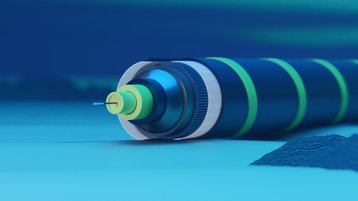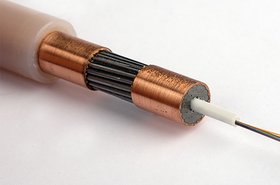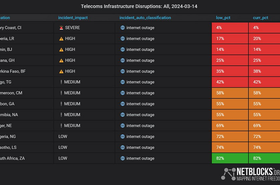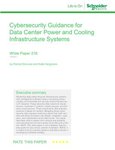Several subsea cables have reportedly been damaged off the coast of Yemen, with some press suggesting terrorist groups are to blame.
One cable operator has confirmed damage to a cable in the region, but said it didn’t know the cause yet.
Israeli press including the Jerusalem Post and Globes suggest four cables - AAE-1, Seacom, Europe India Gateway (EIG), and TGN systems - have been damaged in the Red Sea off the coast of Yemen (though Seacom and TGN are actually one system operated by Seacom and Tata Communications).
The publications claim the damage to the cables was a result of attacks by Yemen’s Iranian-backed Houthi rebels. Globes reports repairs could take up to eight weeks.
DCD has been unable to confirm the reports and has reached out to a number of companies involved with the affected cables including Seacom, Tata, Ooredoo, Bharti Airtel, and Telecom Egypt. We will update as we hear back.
Internet monitoring firm NetBlocks confirmed Internet services in Djibouti had been disrupted, possibly due to cable damage.
"Metrics show a disruption to network connectivity at the Djibouti data center which connects the country's landing stations," the company said on X (formerly Twitter).
Seacom, however, has seemingly confirmed in the African press that it is having cable issues, but didn't go so far as to point the blame at any group.
The company said it has suffered an outage on the Seacom/TGN system, telling ITWeb Africa and others that disruption is affecting the segment of the cable that runs from Mombasa (Kenya) to Zafarana (Egypt).
However, Seacom said it was "unable to confirm the cause of the disruption" and was working to assess the feasibility of the repair in the region.
“The location of the cable break is significant due to its geopolitical sensitivity and ongoing tensions, making it a challenging environment for maintenance and repair operations,” said the company.
Seacom continued: “All other IP-based services destined for Europe and other regions were automatically rerouted via SEACOM’s alternative routes on Equiano, PEACE, and WACS cable systems and supported by its diverse terrestrial infrastructure, ensuring its clients remain operational with some latency in their Internet communications.”
A Cloudflare post from February 27 said its data hadn't observed any clear changes in Internet traffic or latency in potentially affected areas of the region, including Djibouti, Egypt, Kenya, and Tanzania.
However, Doug Madory Director of Internet Analysis at Internet monitoring firm Kentik, noted that IODA data picked up simultaneous drops in pings to several East African countries at around 10:00 UTC on Feb-24.
"This is what we'd expect to see from the loss of Seacom. To their credit, they are one of the more communicative cable operators," he said.
After saying authorities were looking at a possible terror link, Flag Telecom founder and telecoms entrepreneur Sunil Tagare said on his social media accounts that it was “confirmed” the cables had been cut by Houthis – without saying where the confirmation had come from.
He also posted that no cable ship provider was willing to provide repairs in the area and that insurance companies would cancel policies for cable ships attempting to operate in Yemeni waters. Again, DCD hasn’t been able to confirm these claims.
The Iran-linked Houthis – officially known as Ansar Allah – have been attacking commercial ships passing by Yemeni water since November. More than two dozen ships have been attacked by drones, missiles, and speedboats.
Last year Middle East Media Research Institute (MEMRI) – a think tank founded by a former Israeli Intelligence officer and a political scientist described as a neoconservative and revisionist Zionist on Wikipedia – said Telegram channels reportedly affiliated with the Houthis had made implied threats against subseas cables in the Red Sea.
This news was later picked up in mainstream media worldwide. Government ministries and telecoms firms backed by the UN-recognized government condemned the reported threats to the region’s cable infrastructure, while Houthi-backed agencies have labeled the posts “fabricated lies.”
Around 17 cables currently or are planned to run through the Red Sea and link Asia to Europe. Like the Suez Canal in Egypt, the Bab al-Mandab Strait is a natural bottleneck between the Middle East and the coast of Africa.
Also known as the Gate of Grief or the Gate of Tears, the 26 km (14 mi) strait between Yemen on the Arabian Peninsula and Djibouti and Eritrea in the Horn of Africa connects the Red Sea to the Gulf of Aden (which leads to the Indian Ocean).
While it reaches a maximum depth of 3,040 m (9,970 ft) in the central Suakin Trough, the Red Sea averages a depth of around 490 m (1,610 ft). At its shallowest, however, some points are at depths of as little as 100 m (330 ft).
Some military experts have said the Houthis may have the ability to damage cables via trained divers or explosive mines.
Update: the Ministry Of Communications and Information Technology - controlled by the Houthi administration in Sana'a - has denied any involvement in any cable damage.
"MTIT and Government of Yemen (GoY) reaffirm its obligation to the general position of the Yemen Republic toward the submarine cables [and] keen to keep all telecom submarine cables and its relevant services away from any possible risks," the ministry said on X (formerly Twitter).
The MTIT said it was "keen" to facilitate the repair of any submarine cables in the region, so long as parties obtain the required licenses and permits from the Sana'a Maritime Affairs Authority.
"The Sana'a MTIT and GoY also brings to notice that the Yemen's decision to ban the passage of Israeli ships does not pertain [to] the other international ships which have been licensed to execute submarine works within the Yemeni territorial waters," the ministry said.
Update II: New reports suggest a ship attacked by Houthi rebels may have inadvertently cut cables. Some industry observers are suggesting the Rubymar, a cargo ship heavily damaged by a recent Houthi attack, is drifting and its dragging anchor could have caused damage to the cables.
The International Cable Protection Committee (ICPC) released the following comment: "The ICPC urges operators to investigate the causes of damage to Red Sea cables and engage with governments about the implications of such damage. The ICPC also urges governments to coordinate with operators to identify and mitigate causes of damage, expedite permits for repairs, and provide security for vessels engaged in such repairs."
DCD will be exploring the security of subsea cables in the next issue of DCD>Magazine. Subscribe for free today.








